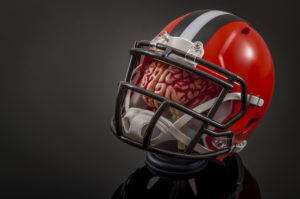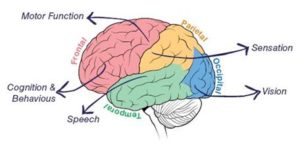
All About Concussions… From Diagnosis to Symptoms
What is a Concussion?
A concussion is a trauma to the brain as a result of direct (blow to the head) or indirect (whiplash) force to the brain. The brain sits inside of our skull, surrounded by fluid that is designed to give it space to move ever so slightly. When a force impacts the head or causes it to move in a certain direction rapidly, the brain can “slosh” inside the skull and bump into the hard bone. This is the trauma that the brain can experience that causes a concussion. Think of it like a bruise to the brain.
In the immediate aftermath of a concussion, blood flow to the brain declines, preventing important energy molecules in the form of glucose from reaching your brain. This creates an energy crisis in the brain which is why fatigue is a primary symptom people experience following an impact.
If you, or your family are involved in sports, it is very likely that you know someone who has suffered from a concussion.
Where else can a concussion occur? (Other than in sports)
– Car Accidents
– Slips/Falls
– Work related injuries
We all know that a concussion is not a good thing and we try to make sports and work as safe as possible to prevent, these or other types of injuries. But sometimes it can still happen and is always best to know what to do if you or someone know has suffered a concussion.
What to do if you think you have a concussion?
If you or someone you know has a suspected concussion, it is important to give them immediate medical attention so that more severe consequences of brain injuries can be ruled out. It also important to stop play or work until you can receive medical attention, as another impact to the brain immediately following the first, can be detrimental. In certain cases, bleeds can develop in the brain, leading to much more severe problems. This can be ruled out by a trained professional, and may require a head scan at the hospital.
Typically it is recommended that immediately after a concussion, the person should rest, stop all screen use and lie down in a dark room. While these things can be important, some light cardio activity can actually help with recovery. It is still important to stop any activity that could involve the risk of second impact, but light activity as tolerated is good to incorporate into a recovery program.
It is important to see a qualified professional for specific advice, as each person and their experience with concussion will be unique. Some are able to resume activities sooner, while others may need longer, depending on the severity of the impact.
After seeing your family doctor, or a physician in an emergency room, a Chiropractor or Physiotherapist should be your next stop for proper diagnosis and advice. However, not all Chiropractors and Physiotherapists are qualified to properly diagnose and treat concussions. This requires special training outside of their schools. Shift Concussion Management is one of the top treatment and education centers in Canada. They offer special training programs to Chiropractors and Physiotherapists. Due to its complex nature, It is important to ask before seeing someone, whether or not they have special education on this type of injury.
Symptoms of Concussion
– Headache
– Dizziness
– Visual problems
– Fatigue
– Difficulty concentrating
– Nausea or vomiting
– Loss of Consciousness
– Memory problems or confusion
– Sensitivity to light or noise
– Balance issues
Because no two concussions are the same, a person’s set of symptoms following a concussion can vary quite a bit. Vision, balance, hearing and speech can all be affected by an impact to the brain. The severity and type of symptoms someone experiences depends on the area of the brain that was impacted and how much force was involved in the injury. For example, an impact to the back of the head can result in more visual disturbances as that is where vision is processed in the brain.
Check out the graphic below to see where our senses are processed in the brain.

It is important to remember that the severity of these symptoms can vary widely, and can last for a few hours, days or up to many months following a concussion.
It is important that your care provider, perform certain evaluation procedures to check the progress of your symptoms and provide you with appropriate exercises to help your brain heal properly. This is not a one-size-fits-all approach and needs to be tailored to the person, depending on their age and recovery goals.
This section was written by Dr. Spenser Dougley D.C from Brant Wellness and Rehab. Dr. Spenser is trained in concussion management.
CONCUSSIONS FROM A NATUROPATHIC POINT OF VIEW
How to Keep your Brain Healthy and Prevent Cognitive Decline
Regardless of whether or not you have experienced a concussion, the following tips are important for overall brain health and should be applied to our everyday lives. They are even more important in the event of a brain injury.
- Use it or lose it! As we age, it is important to keep our brains active. Completing puzzles, reading, and learning new skills are great ways to keep the brain young.
- Reduce processed sugar intake. While sugar in moderation is okay, high blood sugar can actually cause brain cells to die and the brain matter to shrink (this is known as atrophy). In fact, there is initial research suggesting that Alzheimer’s disease is a diabetic condition caused by high glucose levels in the brain, however there is still ongoing research into this theory.
- Fix your sleep. Sleep is an important time for restoring the proper function of your sleep. During this time your body removes toxins from your brain and completes many other tasks to improve functioning. If you are having issues with sleep, consider seeking the help of a naturopathic doctor to see if something in your life is contributing to sleep disturbances.
- Fish oil (or allergen-free/vegan alternative). Omega-3 fatty acids, as found in fish oil, are an integral part of brain health and functioning. Fish oil can also reduce the risk of stroke and other cardiovascular events.
- Reduce inflammation. Systemic inflammation can cause all sorts of issues in the body, among which is a decline in brain health. Treating chronic diseases, healthy eating, moderate exercise, and anti-inflammatory herbs can all help with this. Seek out the help of a trained ND before introducing herbs into your life, so that a comprehensive overview of your health history can be taken into consideration.
Long Term Side Effects of Not Properly Managing a Concussion
- Worsening symptoms. Your concussion symptoms might not seem that significant right now, but without proper treatment, it is possible that they will continue to worsen as time goes on.
- Chronic conditions. An untreated concussion can cause nervous system dysregulation, hormonal dysregulation, and immune system dysregulation, all of which can contribute to the worsening, or development, of many chronic conditions.
- Dementia and neurodegenerative diseases. As we age, untreated concussions put as at a greater risk of developing dementia, Alzheimer’s, and/or Parkinson’s disease.
- Mental health issues. Untreated concussions can lead to, or worsen, many types of mental health conditions as you will read more about in the next section of this blog.
This section was written by Dr. Crysana Copland a naturopathic doctor at Brant Wellness and Rehab. Dr. Copland has a special interest in brain health in her practice.
CONCUSSIONS AND MENTAL HEALTH
Many people are aware of the physical limitations after a concussion or traumatic brain injury (TBI). Whilst a concussion is referred to as a mild traumatic brain injury (mTBI), any small changes in the brain can have a drastic impact on a person’s life.
Many who experience a mild traumatic brain injury will notice new, or worsening mental health concerns. This is often under reported as many believe the mental health symptoms to be a reaction to living with the physical symptoms of a concussion.
It is important to report any of the following symptoms to your medical doctor at the time of seeking treatment for your concussion, regardless of whether they are new or worsening symptoms:
- Irritability
- Anxiety
- Mood Swings
- Depressed mood (including lack of interest in things)
- Feeling Overwhelmed
- Low Energy
- Personality Changes (including increased feelings of anger)
- Suicidal Thoughts
- Drug/Alcohol Use
Another common side effect is disruptions to a person’s sleep patterns. Lack of sleep or interference in sleep patterns can also exacerbate both the physical and mental health symptoms, so it is important to be upfront with your primary health care provider so that a comprehensive plan for your rehabilitation can be made.
Short Term Mental Health Symptoms (Usually appear within the first 10 days)
* Personality Changes
* Sleep Disturbances
* Emotional Disturbances (see above list)
Long Term Mental Health Symptoms (Can last months to years)
* Personality Changes (becoming easily angered, argumentative, suspicious etc)
* Irritability
* Anxiety (including feeling overwhelmed in large crowds)
* Depression
* A small percentage of those injured will go on to be diagnosed with psychiatric disorders (including PTSD, Panic Disorder, Anxiety, Depression.) This is somewhere around 15-20% (https://www.cognitivefxusa.com/ )
How to treat mental health problems after a concussion:
Once your primary health care provider has all of the information, they will come up with a plan for your rehabilitation, which may include using several different health care providers (including chiropractors, physiotherapists, occupational therapists, naturopathic doctors and mental health professionals.)
For any mental health concerns, talk therapy and/or medication may be considered, depending on the severity of your symptoms.
When looking for a mental health professional, it is important to find someone who is registered and in good standing with their college. (See our report on mental health providers). It would also be wise to look for a therapist who has additional training/certifications in treating brain injuries. This will ensure that you are receiving the best possible treatment, specifically tailored to your injury and symptoms.
Here are some important things to remember if you are a caregiver:
As is the case with being a caregiver for a loved one with any illness/disorder, it can be incredibly stressful and exhausting. Injuries/illness that you can’t see (think chronic pain, mental health etc) can be all the more difficult to navigate and understand.
It is natural for a caregiver to experience feelings of frustration, hopelessness, fear, sadness and disappointment to name a few, but try to remember the following:
- Every brain injury and journey to recovery is different so avoid comparing your loved one to others in a similar situation.
- You can’t do it alone. Ask for support. – you will be a much better caregiver when you are surrounded by a community of support and resources. Don’t be afraid to reach out and ask for those resources, not only will you find support from others in similar situations, but you will be able to provide support to others with your own experiences and successes/challenges.
- Not everyone understands brain injuries. Be willing to have discussions with others about brain injuries and your situation. Awareness should bring additional support and understanding into your life.
- Take time for self-care. Burning out will mean your loved one can no longer rely on you, so try to balance your own life and needs with your responsibilities as a caregiver. This can include having your own therapy to manage your feelings, spending time with friends or enjoying a hobby. Self care can also mean making sure you get rest when you can and being mindful of the foods you are eating.
If you, or a loved one are struggling with their mental health after a brain injury, call our office and take advantage of a free consultation with one of our trained mental health professionals.
This section was created by Brant Mental Health Solutions. This blog is not considered complete and is not designed to replace seeking the advice of a trained health care professional.












 Sharon Walker, MSW, RSW
Sharon Walker, MSW, RSW Jordon Iorio Hons. BA, RSW
Jordon Iorio Hons. BA, RSW Christine Bibby, B.S.W., M.S.W., R.S.W.
Christine Bibby, B.S.W., M.S.W., R.S.W. Brianna Kerr, RSW
Brianna Kerr, RSW Danielle Vanderpost, RSW
Danielle Vanderpost, RSW Daniela Switzer, MA, C.PSYCH
Daniela Switzer, MA, C.PSYCH Tammy Adams
Tammy Adams Jade Bates, RMT
Jade Bates, RMT Caitlin Schneider
Caitlin Schneider Dr. Crysana Copland
Dr. Crysana Copland
 Amy Dougley
Amy Dougley Emily Green
Emily Green Bill Dungey, RSW
Bill Dungey, RSW


